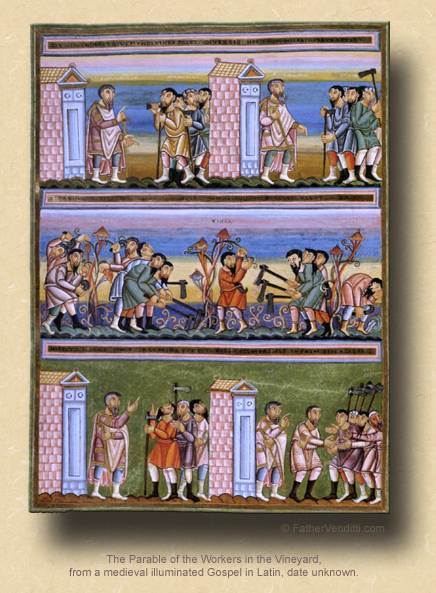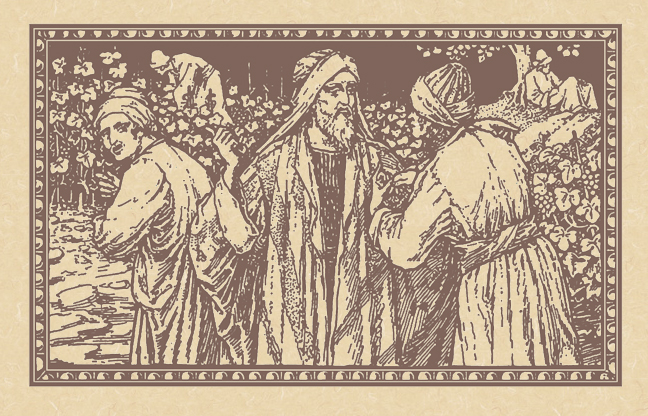Take What Is Yours and Go.
The Memorial of Saint Pius X, Pope.*
Lessons from the primary feria for the Twentieth Wednesday of Ordinary Time, according to the ordinary form of the Roman Rite:
• Judges 2: 11-19.
• Psalm 106: 34-37, 39-40, 43-44.
• Matthew 19: 16-22.
|
…or, from the proper:
• I Thessalonians 2: 2-8.
• Psalm 119: 9-14.
• John 21: 15-17.
…or, any lessons from the common of Pastors for a Pope.
|
The Third Class Feast of Saint Jane Frances de Chantal, Widow.**
Lessons from the common "Cognóvi…" of a Holy Woman not a Martyr, according to the extraordinary form of the Roman Rite:
• Proverbs 31: 10-31.
• Psalm 44: 3, 5.
• Matthew 13: 44-52.
FatherVenditti.com
|
3:27 PM 8/21/2019 — We would not be fooling anyone—except ourselves—were we to pretend to agree with the behavior of the landowner in the parable our Lord tells us in the Gospel lesson. Those who worked no more than an hour get the same pay as those who worked all day. How is that fair? It isn't, because fairness is not a Christian virtue. The fact that most people think it is betrays the extent to which we've allowed our understanding of our own faith to be corrupted by purely social human ethics.
A lot of people make the mistake—or, rather the rationalization—of focusing exclusively on the landowner's punchline at the end of the parable: …an oculus tuus nequam est, quia ego bonus sum? The translation we have here, from the New American Bible, is boilerplate; both the Greek*** and the Latin are much more colorful, and Msgr. Knox gives us an exact translation: “Must thou give me sour looks, because I am generous?” (Matt. 20: 15 Knox). And so, those uncomfortable with the actual point of our Lord's parable find an easy way to skirt the issue by using that last line to dilute our Lord's message to one of the necessity of being generous, which fits in with the program of the moderns of distilling the entire Gospel of Jesus Christ to a mere program of social justice: the whole point of Christianity is loving one another and being kind to one another and caring for the poor and the needy and running soup kitchens and blood drives and having our children save their nickles and dimes during Lent to feed the hungry and—according to their interpretation of today's Gospel lesson—promoting the ethics of justice and equality in society.
But the landowner in the parable is not the villain; he's the hero, in much the same way that the father in the Parable of the Prodigal Son is the hero in spite of the fact that his treatment of his elder son is also very unfair.  It is the paradox of our times: that what everyone thinks Christianity is all about simply cannot be found in the pages of the Holy Gospel. We can try, as many do, to pull one or two lines from a Gospel lesson and use that to try and make the passage be about what we've already decided we want it to be about, as in the case of today's Gospel. Do that enough, and the Gospel is reduced to nothing more than a self-help book that could have been written by Doctor Phil. It is the paradox of our times: that what everyone thinks Christianity is all about simply cannot be found in the pages of the Holy Gospel. We can try, as many do, to pull one or two lines from a Gospel lesson and use that to try and make the passage be about what we've already decided we want it to be about, as in the case of today's Gospel. Do that enough, and the Gospel is reduced to nothing more than a self-help book that could have been written by Doctor Phil.
The point of our Lord's parable is not that it's important to be generous with our money; the point is that how God chooses to deal with us as individuals has no relationship to how he chooses to deal with someone else, which is none of our business. Forgive me for pointing it out, but there is a Commandment about envy. We typically interpret it in terms of coveting our neighbor's material goods, but it applies to our neighbor's relationship to God as well. When we presume that God's treatment of us is unfair because we perceive that he's treated someone else differently, we've “Doctor Philled” the Gospel. We focus so much on our membership in the community of the Church, that we often forget that our relationship to Christ is a deeply personal one. The real punchline in today's Gospel lesson, if you want one, is the not the line “Are you envious because I am generous?” (20: 15 NABRE), but the line “Take what is yours and go” (vs. 14 NABRE).
The longer I hear confessions, the more I am convinced that the greatest struggles we face in the interior life are not temptations of the flesh or distractions in our prayer or dark nights wherein our faith is tested; the greatest damage to interior peace and union with Christ come from comparing ourselves to others. That was the problem with the Pharisee in the Temple: “Lord, I thank Thee that I am not like this publican…” (cf. Luke 18: 11). What kind of prayer is that? What would have been worse is if the publican had said, “Lord, why can't you give to me what you've given to the Pharisee?” He can thank God that he didn't, since we know that the prayer of the Pharisee was not pleasing to God.
Let us pray that all of our prayers will be pleasing to God, and that we will cultivate a deeply personal relationship to our Lord, God and Savior, Jesus Christ, enlivened by our personal prayer, and nourished by our reception of the Most Holy Sacrament of the Altar.

* Born near Venice, Pope St. Pius X (1835-1914) was known for his service to all members of the Church as a priest, bishop, Patriarch of Venice, and Pope. He defended the purity of Catholic doctrine against modern and resugrent heresies and was instrumental in extending the practice of frequent reception of Holy Communion. Most remember him for having allowed children who have reached the age of reason to receive Holy Communion before being confirmed; prior to this, one had to be confirmed to receive the Eucharist. The unfortunate consequence of this was to gradually push the reception of Confirmation further back until it became a kind of coming-of-age ceremony, which is not of the essense of that sacrament. In recent years, many dioceses, some in this country, have elected to return to the more ancient practice, requiring confirmation prior to First Holy Communion. In the Eastern Churches, Confirmation is administered in infancy along with Baptism in the same ceremony, along with Holy Communion.
** This widowed mother of six children who died in 1641, after her husband’s death dedicated herself to the sick and the poor, during which time she met Saint Francis de Sales, and under his direction founded a contemplative community of nuns called the Order of the Visitation. It was a member of this community, Saint Margaret Mary, who, many years later, had visions of our Lord in the manifestation of His Most Sacred Heart, leading to the establishment of that feast. In the ordinary form, St. Jane's feast is August 12th.
*** “…ἢ ὁ ὀφθαλμός σου πονηρός ἐστιν ὅτι ἐγὼ ἀγαθός εἰμι….”
|

